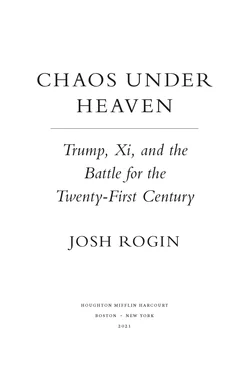Trump was great at flipping over the chess board, but he couldn’t set the board back up again. Nevertheless, he shifted the conversation about China in a way that cannot be undone. This shift was fueled by the slow but steady awakening of various parts of American society to the scope and scale of the China challenge. And it was accompanied by a parallel awakening around the world to the character of the CCP and its broad efforts to both reshape the global order to its advantage and interfere in free and open societies.
Part of what the CCP has done is to disable the antibodies in healthy democracies, through a mix of capturing elites and creating dependencies in all of the institutions that make up the infrastructure of Western democracies, through intelligence and influence efforts of all kinds. Making the US public aware of this challenge is the first step to confronting it, and the Trump presidency forced all Americans to have that conversation, most for the first time.
The coronavirus pandemic has become the lightning rod for discussing previously understood but undiscussed problems every country has had with China’s role in the world. Governments in countries all over are waking up to the difficulties they face as their populations press them to rise to the China challenge. The game is on, whether you like the way the Trump administration played the first inning or not.
Is the United States in a cold war with China? That’s the wrong question, because it doesn’t provide a useful answer. The historical analogy is too imperfect. But the one part of the analogy that holds is that the CCP under Xi sees itself as being locked in an existential ideological and political struggle with the West. Some may argue that ideology doesn’t matter, but the sheer amount of time and effort Xi spends enforcing it shows that it does, to China. Some may argue that America and its allies should avoid casting the US-China competition as a battle between ideologies, but that ship has sailed. Xi is waging an ideological battle, and the West can either engage in it or lose it.
There is no telling what the end game will look like. The United States and its allies must avoid the hubristic idea that the Western world can force on China a political, social, or economic system identical to its own. China’s development will certainly be driven by the Chinese people. But China’s development cannot be allowed to come at the expense of the security, prosperity, freedom, and public health of citizens in free and open societies. And while all people who believe in human dignity want the Chinese government to change its behavior inside its borders, especially as it commits mass atrocities against its own people, the more important task than changing China is changing what China is doing around the world.
The first step for all like-minded countries facing the China challenge is to shore up the world’s democracies by reforming democratic institutions, addressing gaps in national security, strengthening their economies, and protecting their citizens’ public health. The US government can’t compete while mired in the dysfunction wrought by Trump’s mismanagement. America can’t lead a push to defend core values like the rule of law, human rights, political pluralism, and freedom of speech abroad if it doesn’t uphold those values at home. US politicians on both sides must stop using China as a domestic political weapon. And policy makers must start recognizing China as the top priority in our foreign policy, not to be subjugated for the benefit of any other issue. The US government must also be organized around the task. All of the tools of US policy must be put on the table.
The values on which the US system is built—democracy, rule of law, human rights, freedom of speech, freedom of religion, and freedom of thought—are not only the way that humans ought to treat one another. They also are America’s competitive advantage over the authoritarian model that China is putting forth.
America can’t out-China China—and it shouldn’t try. The United States must avoid policies that disproportionately target Chinese and Chinese Americans, who are not responsible for the actions of the Chinese government and contribute greatly to American society. America must not become inhospitable to Chinese visitors in the way China has become for Americans. When it comes to liberal democratic values, America must lead by example and practice what it preaches. If the competition devolves into a race to the bottom, the free and open societies will lose. But in a race to the top, they will win.
Make no mistake, the China challenge will last a generation. It will require free and open governments and societies to grapple with a set of problems that often places various domestic interests in conflict with each other. The economic lure of China will always tempt governments to look away from the national security threats. The available solutions will all be imperfect and come with costs, risks, and trade-offs. All of this will play out over the next few years in a world where the coronavirus pandemic has crushed economies and brought societal and political tensions to a boil.
The goal of the United States and all other like-minded countries should be to establish a relationship between China and the rest of the world that both sides can live with, to avoid the conflict that neither side seeks. The Biden administration has an opportunity to lead the world in getting closer to that goal, but it must move forward, not backward. There will always be pressure from Beijing and aligned forces inside the United States to return to the pre-Trump era patterns of engagement mixed with hope that the problem will somehow go away. But hope is not a strategy.
The precondition for grappling with the China challenge is admitting that the old policies have failed and the CCP’s actions under Xi require a new response. All Americans should work to put aside their differences and come together with allies and partners to craft and mount that new response. Until that happens, the chaos under heaven is likely to only continue.
Acknowledgments
This book is rooted in four years of my reporting on the Trump administration’s approach to US-China relations, supplemented by more than three hundred additional interviews with officials, lawmakers, experts, scholars, scientists, activists, diplomats, and staffers from government, Congress, academia, nonprofit organizations, think tanks, and corporations, each of whom brought a unique perspective to the book and contributed a piece of the puzzle that I have aimed to assemble.
There were dozens of people inside the Trump administration and throughout the US government, from Cabinet members down to staff assistants, who went out of their way to sit for interviews, provide me with documents, and otherwise help me understand the internal workings of the Trump administration and the government as they battled over the US approach to China. In an era when the administration’s relationship with the press was under great strain, these officials took the personal and professional risk of helping me because they believed it was important that the American people understand what had happened inside the US government on this vital issue during this crucial period. I was fortunate to gain insight and knowledge from several Obama administration senior national security officials as well.
Many of the officials who provided firsthand accounts of specific events described in the book were willing to be named and quoted on the record. Many others were willing to be identified on background, meaning not by name, because they were still working in sensitive government positions at the time of this writing. Some officials and sources were not willing to be identified at all, given the nature of their government positions or because they were disclosing sensitive or classified internal government information without official authorization. I have attempted to be as transparent as possible with sourcing information in this book, applying similar sourcing and reporting standards as would apply to my work at the Washington Post.
Читать дальше











